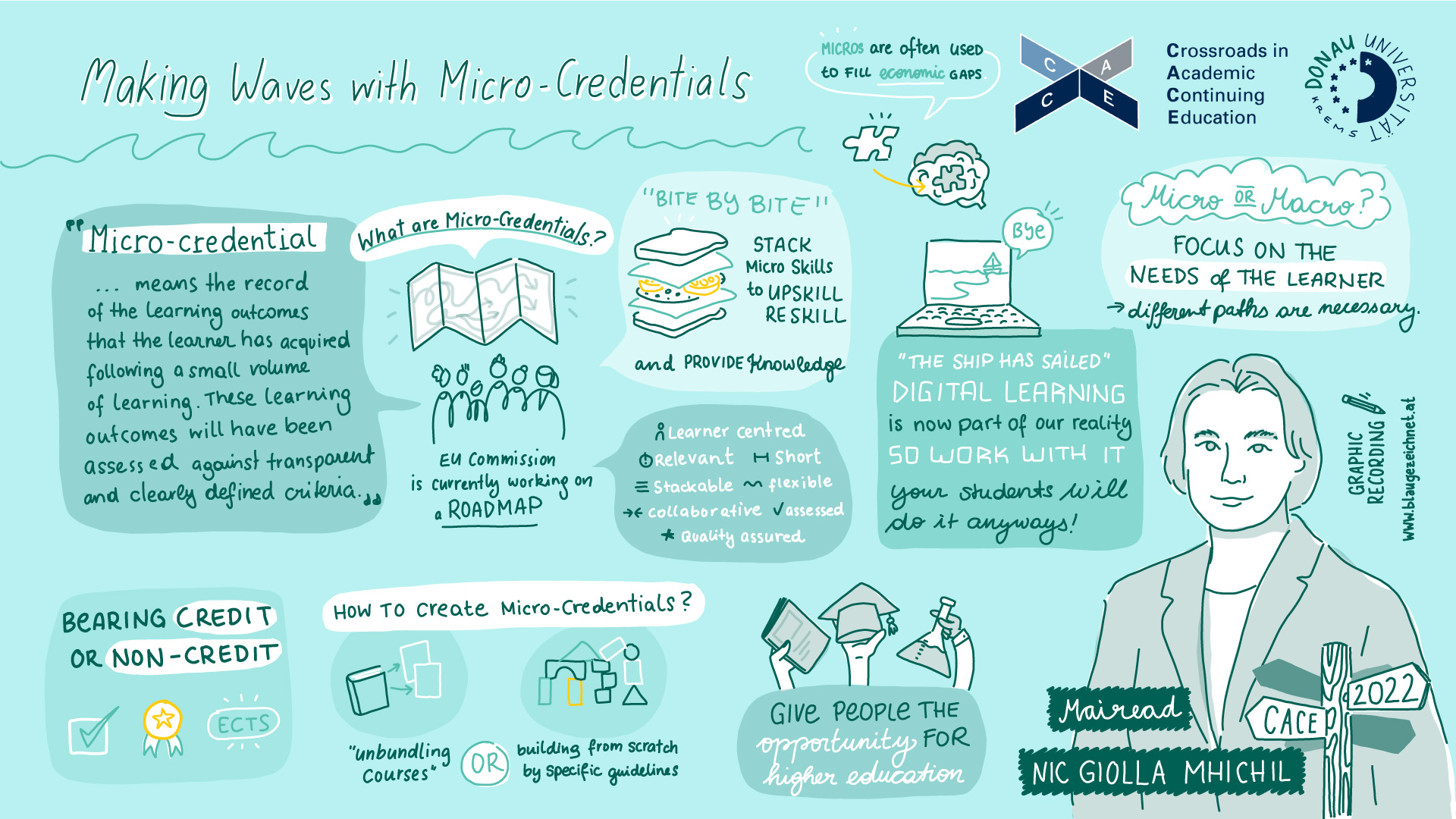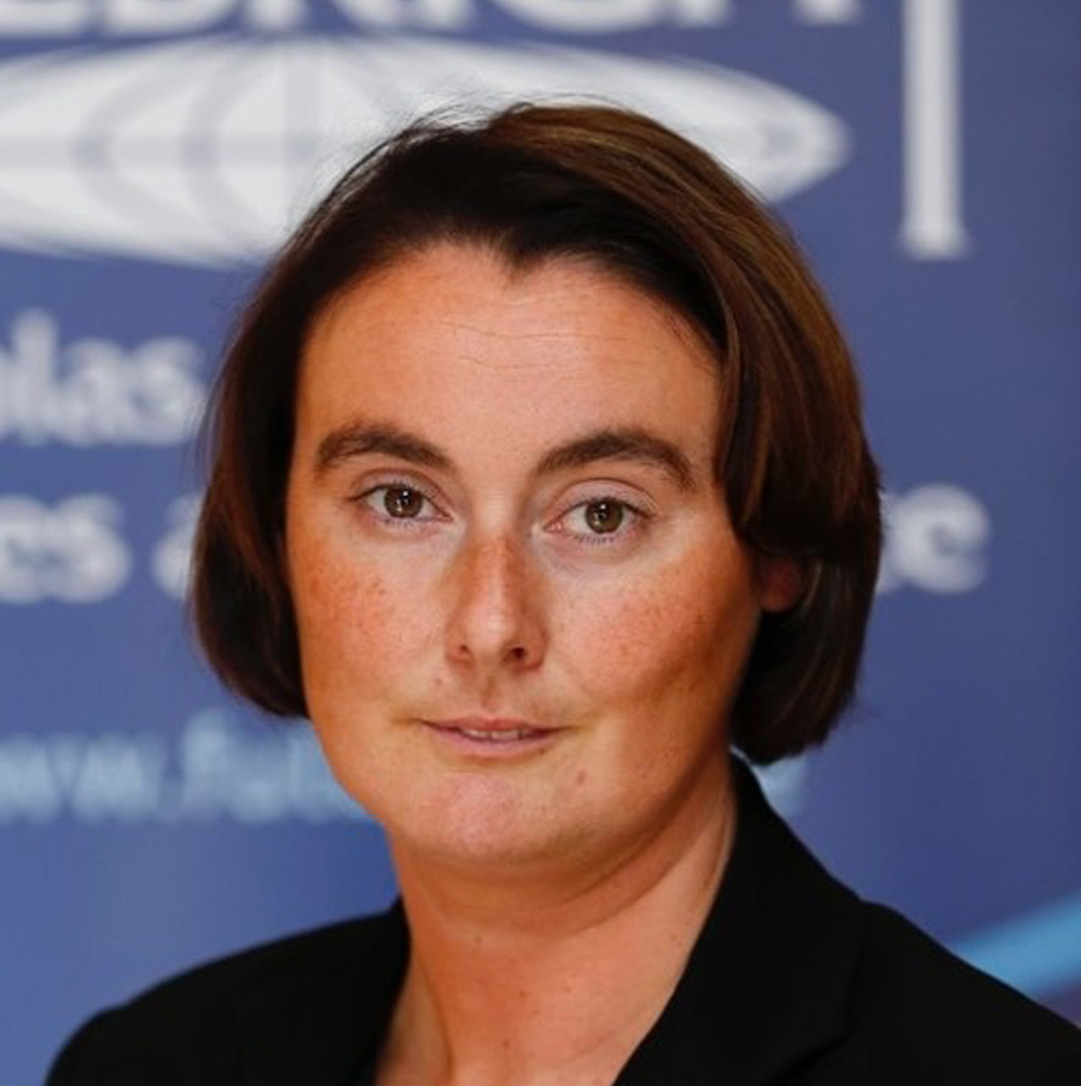blaugezeichnet.2024-09-13-08-27-58.jpg)
In her presentation at the third event of the „Crossroads in Academic Continuing Education“ (CACE) series, Mairéad Nic Giolla Mhichíl spoke about microcredentials. Mhichíl is a professor at the National Institute of Digital Learning at Dublin City University (DCU) and is also responsible for DCU’s microcredential strategy. Microcredentials are used to certify short learning experiences, such as courses or training programs.
According to Mhichíl, there are several different definitions of microcredentials in the literature, but she finds the definition published by the European Commission in 2022 to be very appropriate. It defines microcredentials as „the record of the learning outcomes that a learner has acquired following a small volume of learning.“ The definition also states that „these learning outcomes will have been assessed against transparent and clearly defined criteria.“
Mhichíl emphasized that it is important to understand that microcredentials are a global phenomenon. Not only the European Union but countries and regions around the world, including the United States, Asia, Australia, New Zealand, and Canada, are currently working on implementing this form of learning. Definitions of microcredentials are being developed to include them in the education portfolio.
Various stakeholders are showing significant interest in microcredentials, as they are seen as an opportunity to formally recognize flexible and personalized learning. However, there is also criticism from the academic sphere, primarily due to the belief that microcredentials focus on economic interests. Other critics question the actual impact of microcredentials as a learning experience. Mhichíl recommended taking these tricky and political questions seriously. In her view, the European Union has adopted a good approach to the topic of microcredentials.
Mhichíl then presented questions that institutions could use as a basis for deciding whether to implement microcredentials or not. Why would microcredentials make sense? What is the institution’s motivation for getting involved with microcredentials? Who could assume responsibility for the project? How could we make it work?
Professor Mhichíl also shared how Dublin City University has implemented microcredentials. At DCU, microcredentials have to meet certain criteria that Mhichíl listed in her presentation. For example, DCU microcredentials need to be relevant, short, and collaborative. They must undergo formal assessment and quality assurance. Flexibility is also a crucial factor in these offerings. Examples of DCU microcredentials include FinTech or Business Ethics. Mhichíl also stressed that the implementation of these microcredentials did not happen overnight but through an institution-specific process. Clearly defined goals are indispensable in such a process.
About Mairéad Nic Giolla Mhichíl

DCU appointed Ireland's first Director of Micro-Credential Strategy and Innovation, Dr. Mairéad Nic Giolla Mhichíl. Dr. Nic Giolla Mhichíl is collaborating at national and European level with respect to the European Micro-Credential Roadmap, where she is a recognised policy expert in this domain. She has completed the first state of the art review of global micro-credential implementation and policy and has worked with UNESCO to develop a global definition of micro-credentials under the lead of Professor Beverley Oliver. Dr. Nic Giolla Mhichíl is co-founder of the Micro-Credential observatory which curates global micro-credential research and developments. In 2020, she co-authored a Global Insights Report on micro-credentials in in 2020 and in collaboration with DCU’s Irish Institute of Digital Business and Skillnet Networks she was lead author on a publication to guide industry in its engagement with Micro-Credentials, A Micro-Credential Roadmap: Currency, Cohesion and Collaboration, as part of this work she published the First National Micro-Credential Survey of Irish Employers and Employees in 2021. Mairéad is DCU's Micro-Credential lead in the ECIU University and she is DCU's representative on the national steering Committee of Micro Creds initiative under the Irish Government's Human Capital Initiative (HCI) see www.microcreds.ie. Mairéad is leading out as co-editor in chief on a special issue on micro-credentials in the International Journal of Educational technology in Higher Education (ETHE) currently available.